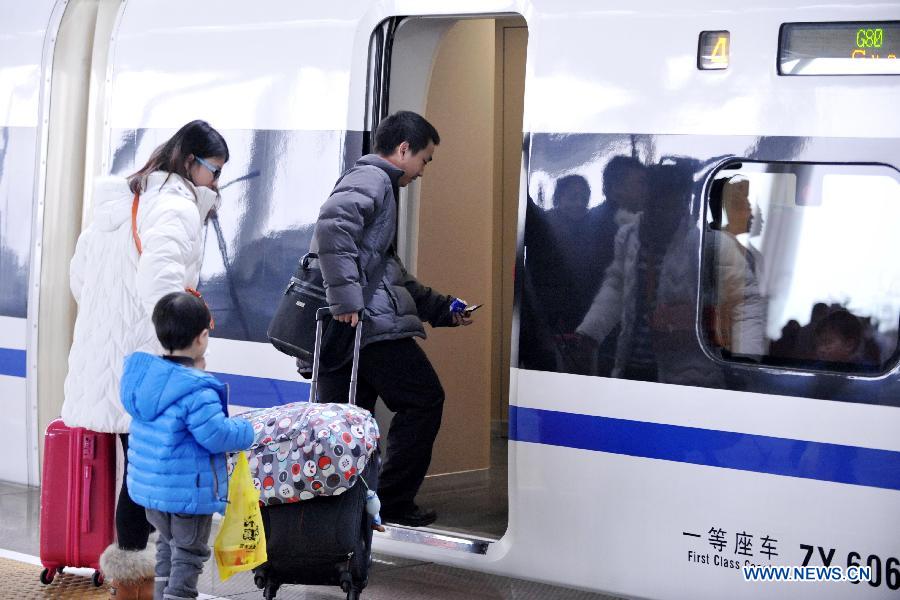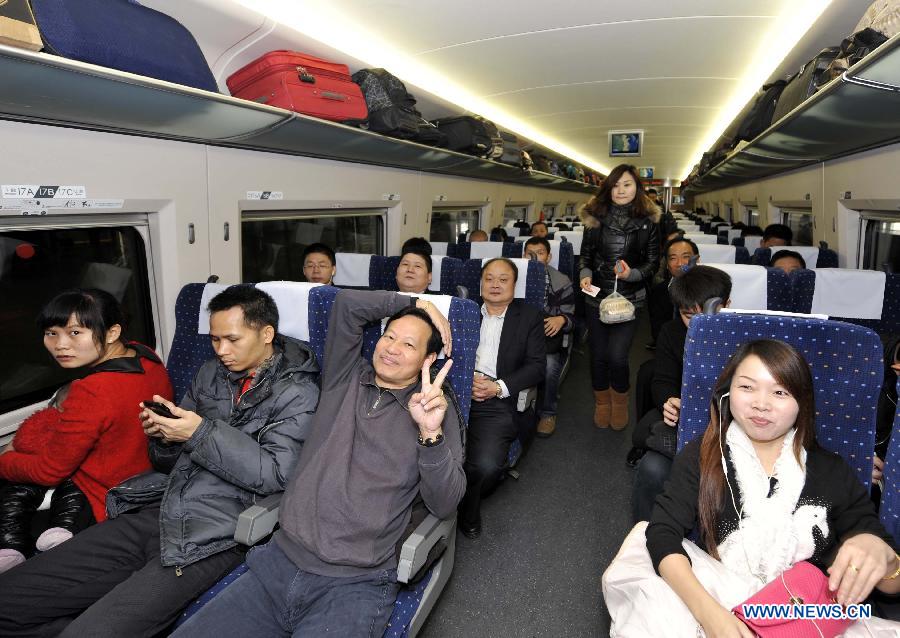(from cntv.cn)
With the Spring Festival around the corner, many migrant workers are planning to go back home to celebrate with their families. Every year it’s hard to get a ticket. With the Beijing to Guangzhou high-speed rail coming to service, will the situation improve?

Passengers board bullet train G80 to leave for Beijing, capital of China, from the Guangzhou South Railway Station in Guangzhou, capital of south China’s Guangdong Province, Dec. 26, 2012. The world’s longest high-speed rail route linking Beijing and Guangzhou started operation on Wednesday. Running at an average speed of 300 kilometers per hour, the 2,298-kilometer new route will cut the travel time between Beijing and Guangzhou from more than 20 hours to around eight. (Xinhua/Chen Yehua)
|
|
There are more migrant workers in Guangzhou than any other city in China. Its railway station has faced severe capacity problems.
230,000 passengers use Guangzhou station each day during the travel peak. It’s normal capacity is only 40, 000. 32 million journeys are expected to be made here during the Spring Festival. And migrant workers have always found it extremely hard to buy a ticket. Now, with the Beijing to Guangzhou high-speed rail coming to service, people say it’s much easier for them to go back home during the Spring Festival. |
Migrant worker in Guangzhou said, “In the past, it took more than 20 hours for me to go home. And it’s hard to buy tickets. Now booking tickets is very convenient. And if I get on the train in the morning, I can have dinner with my family in the afternoon.”
The Beijing to Guangzhou high-speed rail will also help cargo transport.
|
|
Cargo delivery has always suffered significant delays to make way for passengers.
Li Zhiyong, Logistics Dep’t, Shaoguan Steel Company, said, “The railways have only met 40% of our company’s transport needs. We had to rely heavily on roads and highways.” This year, 33 trains will be used for cargo each day. Annual cargo capacity is expected to reach around 88 million tons, five times the amount last year. |

Passenger Xie Xiaoxue shows her ticket of high-speed train G90, which is to leave for Beijing, capital of China, from the Zhengzhou East Railway Station in Zhengzhou, capital of central China’s Henan Province, Dec. 26, 2012. Zhengzhou is one of the 35 stops of the 2,298-kilometer Beijing-Guangzhou High-speed Railway, the world’s longest, which was put into operation on Wednesday. Running at an average speed of 300 kilometers per hour, the high-speed railway will cut the travel time to about 8 hours from the current 20-odd hours by traditional lines between the country’s capital and capital of south China’s Guangdong Province. (Xinhua/Zhao Peng)

Bullet train G801 leaves the Beijing West Railway Station in Beijing, capital of China, for Guangzhou, capital of south China’s Guangdong Province, Dec. 26, 2012. The world’s longest high-speed rail route linking Beijing and Guangzhou started operation on Wednesday. Running at an average speed of 300 kilometers per hour, the 2,298-kilometer new route will cut the travel time between Beijing and Guangzhou from more than 20 hours to around eight. (Xinhua/Li Wen)

Passengers enter the Beijing West Railway Station to board bullet train G801, which is to leave for Guangzhou, capital of south China’s Guangdong Province, from Beijing, capital of China, Dec. 26, 2012. The world’s longest high-speed rail route linking Beijing and Guangzhou started operation on Wednesday. Running at an average speed of 300 kilometers per hour, the 2,298-kilometer new route will cut the travel time between Beijing and Guangzhou from more than 20 hours to around eight. (Xinhua/Li Wen)

Passengers are seated on bullet train G80, which is to leave for Beijing, capital of China, from the Guangzhou South Railway Station in Guangzhou, capital of south China’s Guangdong Province, Dec. 26, 2012. The world’s longest high-speed rail route linking Beijing and Guangzhou started operation on Wednesday. Running at an average speed of 300 kilometers per hour, the 2,298-kilometer new route will cut the travel time between Beijing and Guangzhou from more than 20 hours to around eight. (Xinhua/Chen Yehua)